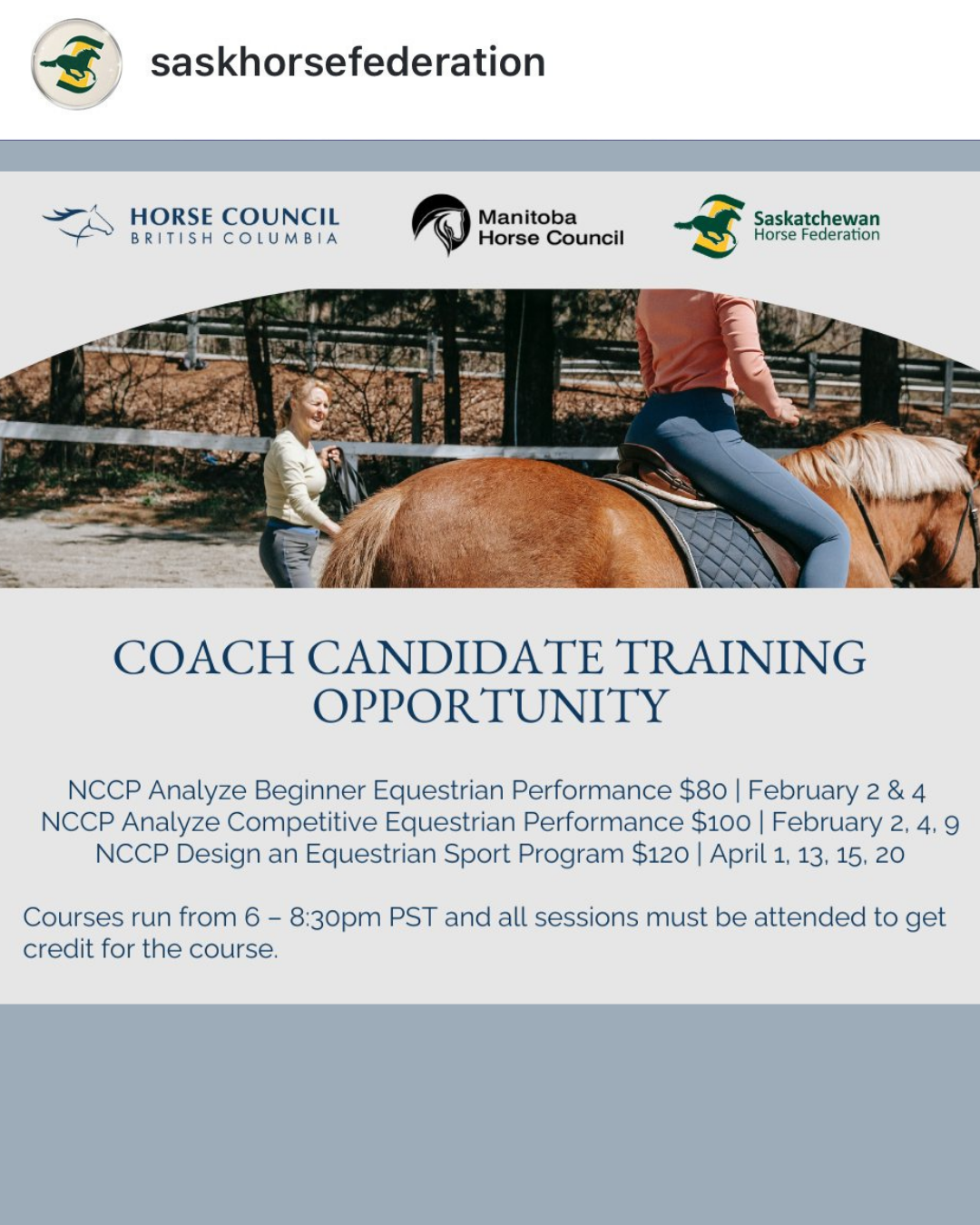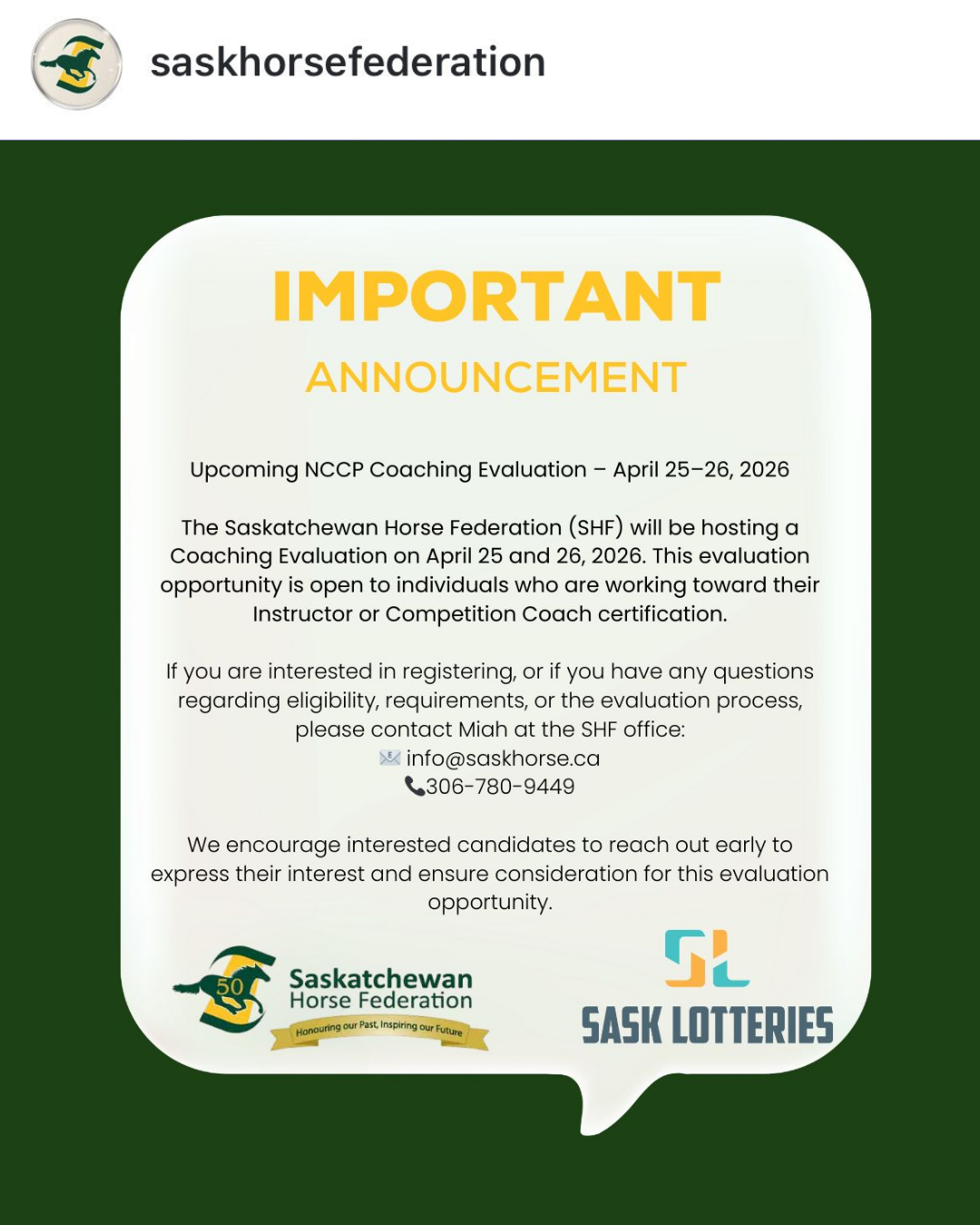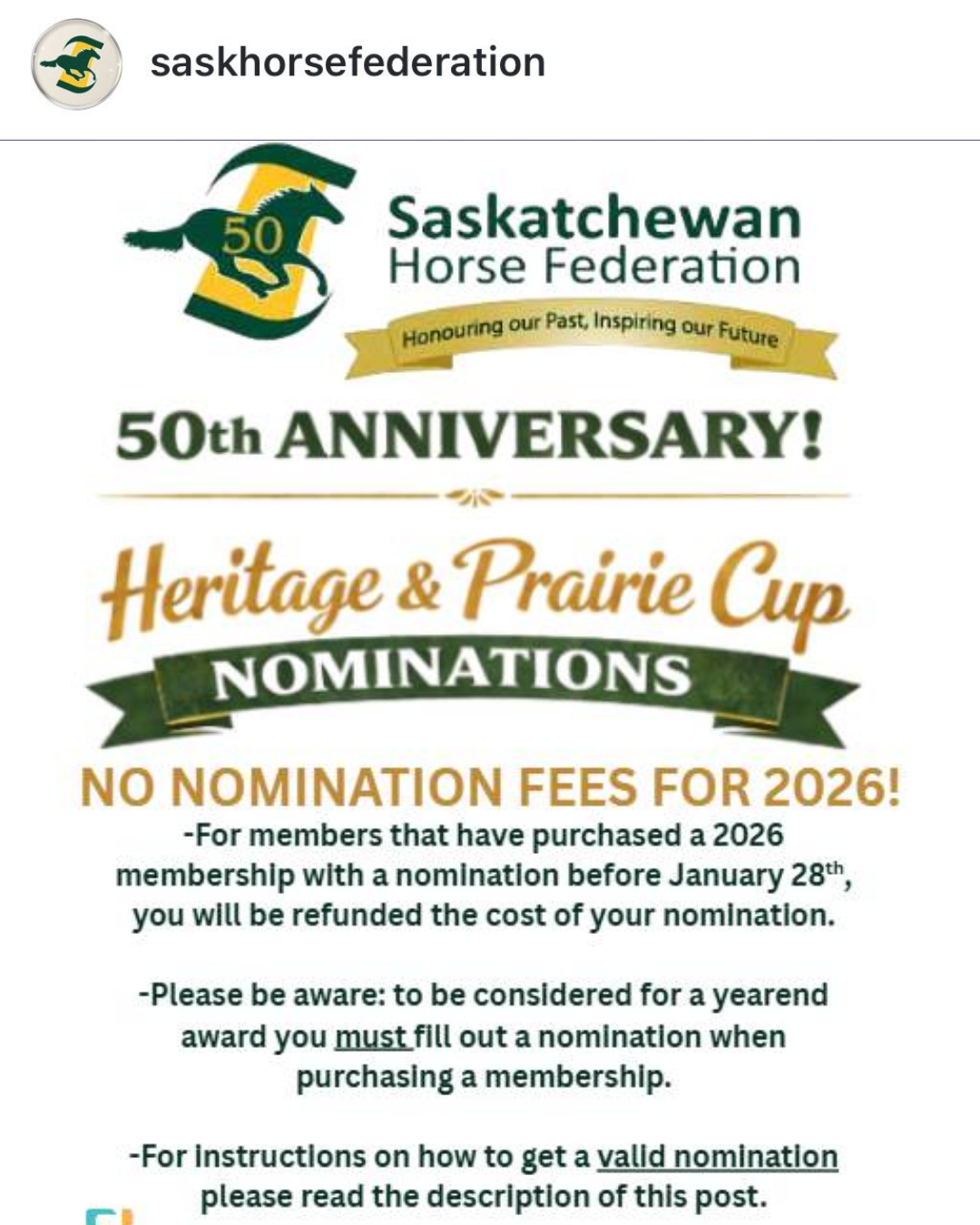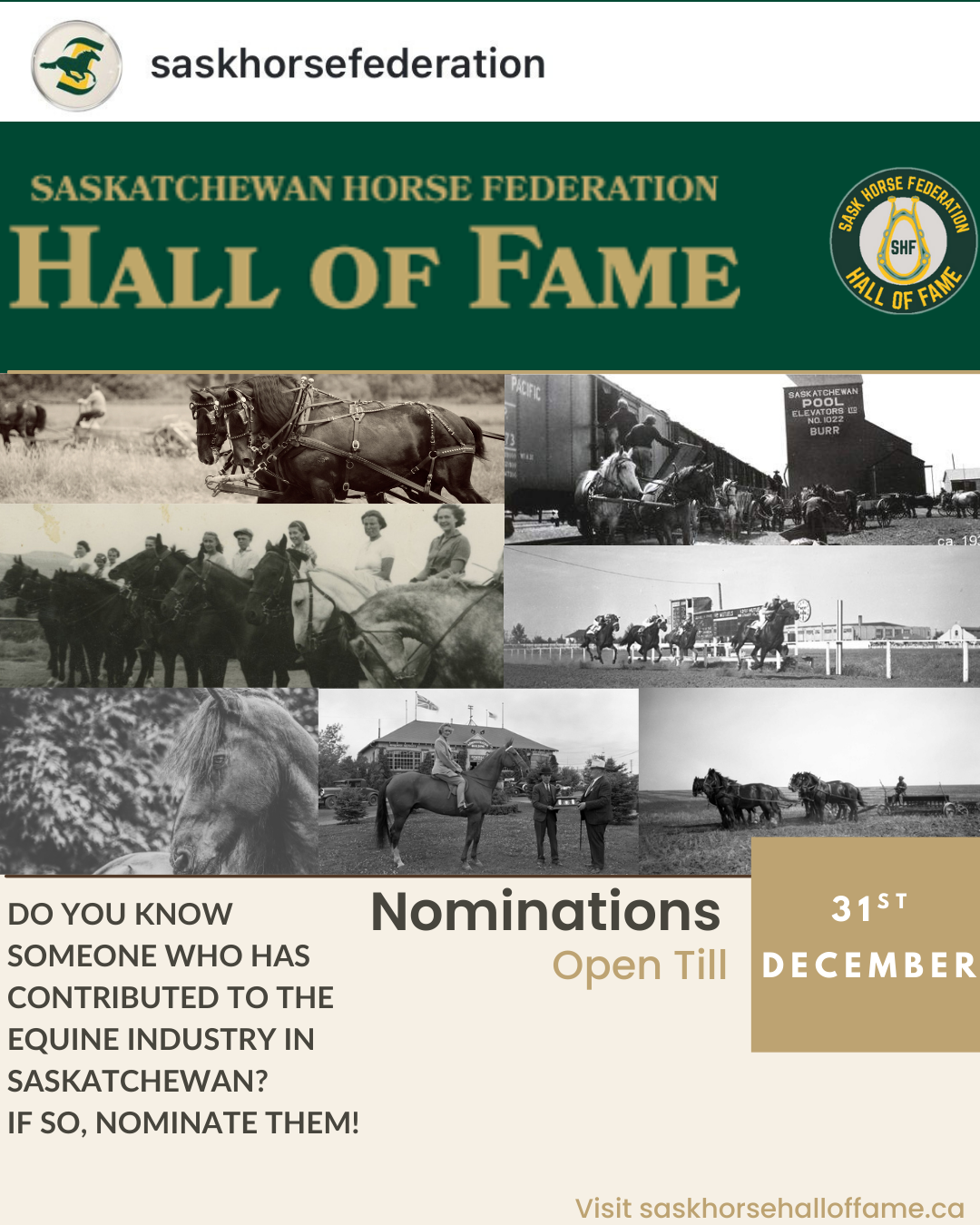
News Corner
Nov 24, 2025
Call for Nominations
Call for Nominations for the 2026 Annual General Meeting The Saskatchewan Horse Federation (SHF) serves its members through the development and oversight of sport, recreation and industry initiatives, while following established standards of safety, fair play and equine health and welfare.
The Board of Directors (BOD) is responsible for providing leadership for the organization and to conduct the business affairs of the Federation for the benefit of the entire membership. Board of Directors are expected to attend in-person meetings, including the Annual General Meeting, and to serve on such committees as developed to undertake activities of the Federation.
The SHF Board of Directors is a duly constituted body governing the Federation on behalf of the membership. Board members have a collective responsibility to run the affairs of the organization in accordance with the Saskatchewan Non-Profit Corporations Act (NFP). The bylaws of the SHF establish the authority of the Board of Directors as a collective entity and legislation holds board members legally responsible to act in the best interest of the membership.
If you are an adult member (18 years or older) in good standing and would like to nominate someone (who is also an adult member in good standing) to be considered for a three-year term on the Board of Directors, you must submit nominations to the office of the Saskatchewan Horse Federation before January 5, 2026, at 4:00 PM.
*NOTE* All nominees MUST be adult members in good standing for 2025 and 2026 at the time of nomination. Memberships are available for purchase prior to year end to ensure your membership does not lapse. Please note that a Criminal Records check is required from all candidates.
Successful candidates will be determined by election at the Annual General Meeting of the membership.
Nominations Forms available at www.saskhorse.ca/news-events/agmor email [email protected]
Nov 9th, 2025
WCVM Horse Health Sense: Impaction colic
Some horses are finicky drinkers at the best of times, and the transition between the fall and winter months can be a particularly challenging period. At this time of year, horses have a higher risk of developing impaction colic when their diets change from moist pasture grass to dry hay. Another contributing factor is changing weather: horses’ water bowls or tanks can potentially freeze overnight if there’s a cold snap or unexpected storm — causing a decrease in their water intake.
Impaction colic is a type of colic that’s like constipation in people and other species. When a horse doesn’t drink enough water, it causes the feces in the small colon to become very firm and dry. Over time, the feces get drier and harder, causing increased pressure in the intestine. In severe cases, these hard feces can cut off circulation in the horse’s intestinal walls.
If your horse is displaying signs of colic such as a disinterest in eating and drinking, pawing, sweating in patches, rolling and looking at their flank, call your veterinarian. Your vet will determine if colic is the problem by performing a rectal exam. If they feel a dry, hard mass of feed content, then it’s likely an impaction colic.
What can you do to prevent impaction colic?
• Ensure that your horse has access to a consistent water source that will not freeze over in colder temperatures.
• Since horses are less inclined to drink cold water, consider investing in a heated watering bowl or tank heater to keep the water temperature between seven and 18 C.
• Don’t rely on snow as an adequate watering method. Most horses don’t eat enough snow to meet their water requirements, resulting in dehydration and impaction colic.
Nov 3, 2025
Saskatchewan Horse Federation Statement regarding Equestrian Canada's Proposed rule change regarding Competition Sanctioning and EC Officials.
The Saskatchewan Horse Federation opposes these suggested rule changes because we do not feel they are in the best interest of equestrian sport. These changes will hurt four major pillars of LTED- Provincial Competitions, Officials, Coaches and Athletes.
Every rider- from Beginner to High Performance - has the right to be supported by certified officials and sanctioned competitions that follow established standards of fair play, safety and equine welfare.
Oct 27, 2025
WCVM Horse Health Sense: Fall laminitis
As lush green grass withers to crispy brown threads in the fall, it may seem like the risk of laminitis is low for the horses grazing in their pastures. Colder weather brings the risk of fall laminitis — especially for obese horses and those with a history of laminitis, metabolic syndrome or PPID (pituitary pars intermedia dysfunction).
What can horse owners do to prevent a surprise spell of fall laminitis?
• Call your veterinarian if your horse exhibits any signs of laminitis such as being reluctant to move, attempting to shift their weight off affected feet, or a pronounced digital pulse in the fetlock area.
• Limit fall pasture time for horses that are predisposed to laminitis.
• Remove horses from pasture when the overnight temperature is below 5 C
• After a cold night, keep horses off pasture for several days to allow the sugar levels in the grass to return to normal.
Learn more about preventing laminitis.
Oct 20, 2025
The CHIP Traceability Initiative
The Canadian Horse Identification Program (CHIP), administered by Equestrian Canada, is more than a national initiative — it’s a powerful tool that helps protect and grow the equine industry in every province, including right here in Saskatchewan. Through the participation and support of the CHIP initiative, Saskatchewan’s industry can benefit in many ways:
- Secures Livestock Status
- Safeguards Horse Health Across SK
- Boosts Emergency Preparedness
- Supports a Thriving Equine Economy
- Informs Smarter Local Decisions
- A True National-Provincial Partnership
Let’s lead the way. Together, we can protect what matters — our equines, our people, and the future of the equine industry in SK. Read more.
Oct 16, 2025
WCVM Horse Health Sense: Bale Net Wrap
Bale net wrap does a great job of preserving feed quality, but if your horse happens to eat remnants of the plastic wrap, it can cause some serious health issues. Dr. Alannah Friedlund, a veterinarian and large animal surgical resident at the Western College of Veterinary Medicine (WCVM), is seeing a growing number of horses that have ingested net wrap, and as a result, have developed colic.
Friedlund says awareness is critical for avoiding this serious issue, and she recommends following five safe feeding practices.
- Remove all net wrap from hay bales before feeding.
- Consider alternative feeding methods to make it easier to identify and remove potential hazards.
- Always remove net wrap before processing bales into chopped hay.
- Regularly check fields and paddocks for net wrap debris.
- Call your veterinarian if your horse shows any signs of colic.
For more details, read the article in #WCVM Horse Health Lines, newsletter for the Townsend Equine Health Research Fund. Read More.
Oct 10, 2025
What to do when you find stray livestock- By Ministry of Agriculture
Livestock usually leave the farm by way of truck and trailer. But sometimes, they leave on their own without the producer knowing, running at large and considered stray. If a stray is running at large, the owner must take immediate action to capture the animal as soon as they know it is at large. If the stray is a domestic game farm animal, fur farm animal or farmed wild boar, the owner must immediately report the escape to their game farm inspector. Read More.

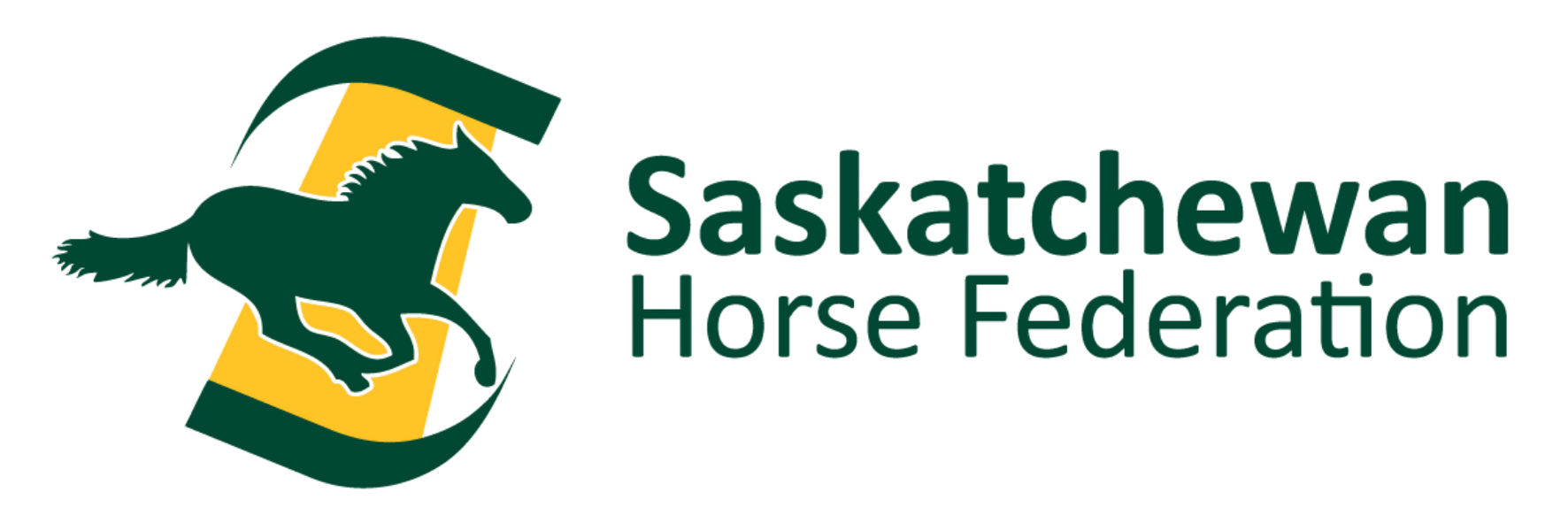

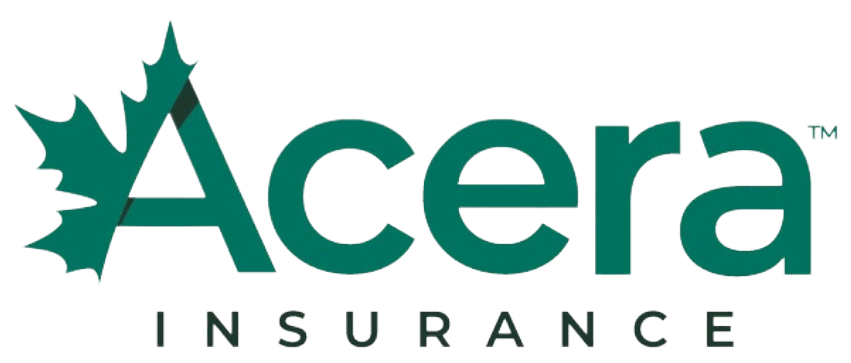
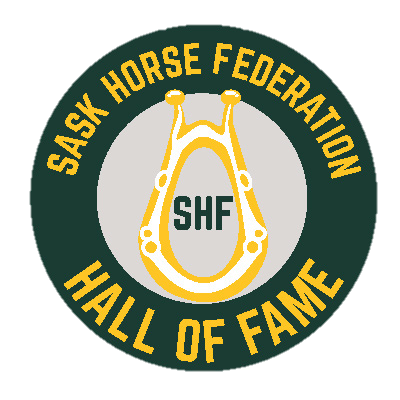
.png)
